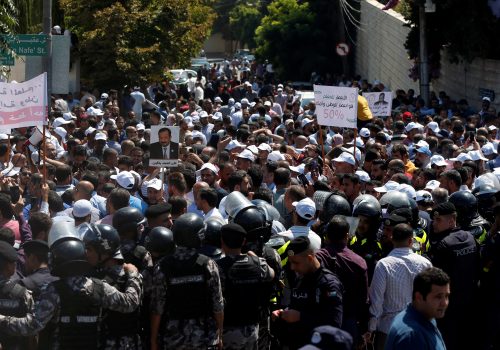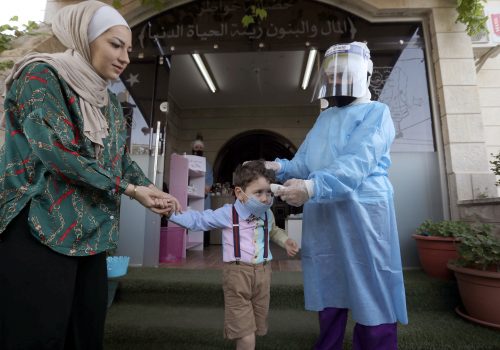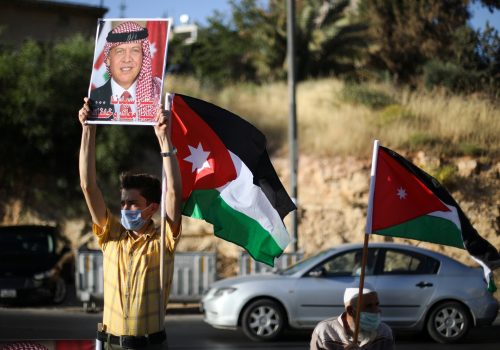Jordan protests met with repression as government changes tactics
On the heels of successfully managing the coronavirus pandemic, Jordanian officials are now cracking down on another type of outbreak: peaceful teacher protests. Jordanian officials arrested the board of the Teachers Syndicate on July 25 and shut it down for the next two years. The allegations against the teachers’ union are questionable at best but the way in which the government has conducted arrests and suppression of free speech and expression is the most troubling.
Plainclothes men detaining peaceful protesters, police arresting lawful syndicate members, and the imposition of gag orders and internet blackouts would be much less surprising in Abdel Fattah al-Sisi’s Egypt or Mohammed bin Salman’s Saudi Arabia. While Jordan is by no means a democracy, compared to its regional neighbors, the country has retained a level of openness that previously allowed—up to an undeclared point—the right to peaceful protest, some opposition media, and some imitation of free-and-fair national and local elections. The censoring of opposition voices—from the Teachers Syndicate to the Muslim Brotherhood organization—represents a new phase for Jordan—a country that has tried to be an island of calm in a sea of upheaval that has dominated the region since the 2011 Arab uprisings.
On July 25, Amman’s prosecutor general arrested thirteen board members of the governing council of the Teachers Syndicate under the cover of pending investigations against the union. They syndicate was ordered to cease operations for two years and shut down its headquarters in the capital and branches across the country. The state news agency Petra announced “the decision was based on the Public Prosecution’s consideration of three pending criminal cases that the association’s council faces related to financial violations, “‘inflammatory measures’ announced by the syndicate’s council and circulated on social media, and a case before the Amman Prosecutor about videos posted on social media by the association’s deputy head. No more details about the charges were provided, creating more questions about the timing and purpose of the announcement. In addition, legal experts cited the lack of basis for shutting down the union: “the group’s board can only be dissolved by a two-thirds vote of the members of its central committee or by judicial order. Under Jordanian law, neither the Attorney General nor another public prosecutor is empowered to make judicial orders.” The same announcement also included a gag order against any public discussion or reporting on the issue except by entities authorized by the state.
The confrontation between the government and the Teachers Syndicate began before the 2019-2020 school year, when the latter led one of the longest professional strikes in the region’s history. As a result, the school year was delayed for six weeks as teachers called on the government to implement salary raises that were promised years earlier. The strike ended when a deal was reached with the government for a gradual increase in pay, which was implemented in January and continued until the COVID-19 pandemic spread across the world. The economic impact of the outbreak prompted the government to make salary cuts and execute other measures to absorb the shock to the financial system.
With tension between the teachers and the government already palpable, the public reaction to the abrupt and widely unpopular arrests was immediate. Teachers took to the streets to voice their outrage at the treatment of the syndicate leadership and members and, more broadly, the harsh behavior towards teachers since their protests began in August 2019. The official government reaction was swift, enacting street closures, public displays of force, an internet blackout, and arrests of protesters and more syndicate members. What followed was more widespread protests in parts of the country that do not typically see such public displays of discontent against the government. By this point, the teacher protests had evolved into larger protests surrounding perceived corruption at senior levels of the government, anger about the repression of peaceful protests and freely elected syndicates, and deep-seated frustration about the economic challenges facing most Jordanians (COVID-19 notwithstanding).
While Jordanian streets witnessed significant protests on several occasions since the 2011 uprisings, two primary issues distinguish the recent events and show disturbing signs of a broader crackdown by Jordanian authorities: (1) severe restrictions on freedom of expression and information and (2) an unprecedented use of force and extrajudicial arrests of peaceful protesters. Nevertheless, despite this reality, large protests were seen across the country in Karak, Jerash, Irbid, Tafileh, Madaba, and every major town and governorate in the country.
Furthermore, the lack of detail provided on the questionable charges against the teacher’s union has fueled anti-government sentiment and created a breeding ground for conspiracy theories. It has also made a mockery of the judicial system that seems to have been sidelined or manipulated in these cases. The gag order on discussion of the union shutdown and subsequent media blackout naturally resulted in social media becoming the primary source of news and information for the public. The fact that state–controlled and even private news outlets in Jordan made absolutely no mention of widespread protests is indicative of the culture of fear the government has created to prevent coverage of the public response. Protestors did not mince words, calling out the “failed and colluding media” in protests like this one in the second largest governorate of Irbid.
Beginning with the arrest of the thirteen council members who govern the Teachers Syndicate to the dozens of arrests that followed other syndicate members and protesting teachers, the level of force and arbitrary detention exhibited is unprecedented in recent Jordanian history. The way the deputy head of the Teachers Syndicate was arrested, according to interviews with his family conducted by Human Rights Watch—with unmarked vehicles surrounding him on a major highway, covering his head with a plastic bag and detaining him—is a scene that is unfamiliar to Jordanians. While peaceful protests are typically allowed in the country, authorities are currently arresting protestors on the basis of such gatherings being outlawed under the current state of emergency that has been in place to fight the COVID-19 pandemic. This is despite the fact that emergency laws cannot override constitutional protections for free speech and assembly.
Social media and widespread access to mobile phones and internet services have helped organizers publicize and spread information about demonstrations, while those not participating are watching events unfold in real time. A widely circulated video of the arrest of female teachers in Irbid has garnered thousands of views and fueled anger across social media platforms. As we have seen in similar scenes across the region, it often takes one story, image, or video to fuel an already troubled population to take to the streets and reject the outdated social contract that has kept a handful of undemocratic regimes in power so far.
The Jordanian government faces real economic challenges that are hitting a large swath of the population. In addition to the reality of a shrinking economy due to the ongoing lockdown, remittances from abroad have also dried up, as Jordanians working outside the country face similar financial struggles. While Jordanian authorities have won kudos for their diligent and effective containment of the virus, they are quickly losing that goodwill as they crack down on freedom of expression and target those most vulnerable to economic challenges. Moreover, the lack of transparency in how government aid is being distributed through the “COVID fund” has naturally fueled anger and questions by those not receiving much-needed socio-economic protections.
With that in mind, support for the Teachers Syndicate is widespread because teachers represent the Jordanian middle and working class; their struggle to maintain a living wage amidst the rising cost of living is something that almost every Jordanian can relate to. What may have started as a teachers’ strike in 2019 to demand living wages, has now progressed to a serious confrontation between the Jordanian government and its middle and working class. While the rest of the world similarly faces the harsh economic realities of the pandemic, Jordanian authorities can and must tackle issues of corruption with full transparency to show that concerns about economic disparity are being addressed. With youth unemployment in the country approaching 40 percent, there is a dire need to engage youth in productive work that will yield a much needed dividend for the country. In the absence of work, income, and means to influence policy, Jordanian youth will be leading protests for the foreseeable future.
For every teacher that is arrested and every journalist that is silenced, dozens more will emerge as citizen journalists with collectively larger platforms and wider reach than traditional state-run media outlets. Unlike their counterparts in the region, Jordanians have enjoyed relatively more freedom of expression and are unfamiliar with the kind of police state tactics employed by other governments in the Arab world. The Jordanian government must make a concerted effort to address the serious economic challenges and disparities that have marginalized a majority of Jordanians with little options left but to strike or protest the conditions they face.
Tuqa Nusairat is the deputy director of the Rafik Hariri Center and Middle East Initiatives at the Atlantic Council. Follow her on Twitter: @TuqaNusairat.
Image: Demonstrators gather outside the professional syndicates building in Irbid on July 26, 2020. (7iber)


